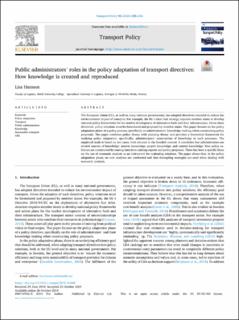| dc.description.abstract | The European Union (EU), as well as many national governments, has adopted directives intended to reduce the environmental impact of transport. For example, the EU’s clean fuel strategy requires Member States to develop national policy frameworks for the market development of alternative fuels and their infrastructure. Given these directives, policy solutions must be formulated and proposed by Member States. This paper focuses on the policy adaptation phase of a policy process, specifically on administrators’ knowledge-making when constructing policy proposals. The paper combines policy theory with planning theory and provides a theoretical framework for studying policy adaptation, specifically, administrators’ construction of knowledge in such processes. The empirical study is based on two cases, both situated in the Swedish context. It concludes that administrators use several sources of knowledge: process knowledge, project knowledge, and context knowledge. New policy solutions are constructed by reusing data from existing reports and policy proposals. A specific focus has been on the use of economic analysis as an instrument for evaluating solutions. The paper shows that, in the policy adaptation phase, no new analyses are conducted and that decoupling strategies are used when dealing with economic analysis. Keywords: policy adaptation, transport, public administration, knowledge, sustainable transport, CBA | en_US |

